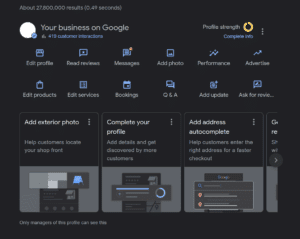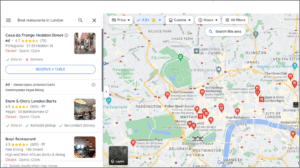For many years, the best practice for an effective local SEO strategy was to have a consistent NAP on local listing sites. Although consistent NAP is still important in key sites, it is no longer the case that you have to be listed everywhere!
Today, many local listing sites have little impact on local SEO, particularly those sites that list for the sake of listing and offer no value to customers.
NAP everywhere is not necessary
In Moz Local’s annual local search ranking factors study, it is clear that the importance of local citations and local listings is declining. We’ve seen this ourselves and note that aside from a few key sites, the greatest value sites are sector focused with highly localised and relevant customer content.
“Citations and links as we have known them will continue to play a part in the ranking algorithm, but they will be less and less important as Google increases their understanding of entity prominence and the real world.” Mike Blumenthal – GetFiveStars
This is because Google is getting smarter at recognizing local citation sites that are valued by customers whilst ignoring those that are not. Google also now places more value on brand sites that use correct local NAP micro-formants and schemas.
If a listing site does not offer value to users, then how can it benefit you?
Where should multi-location brands be listed?
Given the shift in Google local, multi-location brands can relax about being listed everywhere and focus on the places that matter to their customers.
In our experience, most established multi-location brands tend to have many (organic) local listings anyway. These will naturally arise due to the way that listing sites ‘propagate’. There may be NAP inconsistencies, but unless these are dramatically wrong, these are unlikely to interfere with local search performance. The focus then becomes one of listing new stores and removing old store listings.
There are exceptions, for example, chains that have re-branded or move premises frequently. In this case, legacy listings can confuse the search engine and customers. There are also chains in certain sectors that, for whatever reason, do not have an organic listing presence, and as a result do not appear in search.
This is not to say that you can get away with one or two listings, nor will you be penalized if you have many, you just need to be smarter about which listings need to be managed.
Sector-specific, niche local citations, and sites that have high customers engagement with reviews (for example) are valuable.
There are some key listing aggregator and distributor sites that you do need to be listed, however, there are many local listings sites that you can ignore. It really does depend on your sector.
A simple technique to determine which sites to use is to see what sites appear in local organic search within your area. A local listing site by its very nature should be optimized for local search. If a site does not naturally appear in organic search, then why bother with it? There are too many of these to list them.
Our principle is; if a listing site does not appear in local organic search, it is not sufficiently valued by Google, and is very unlikely to be valued by users; so why waste your time managing listings on it?
Page rank and domain authority are guiding factors, but not absolute guides. Some high performing local sites may be sector-focused or highly localized; with little global authority, but highly localized value. That site may be at the bottom of the table in rankings, but at the top of the table in local search in a given area.
Essentially, multi-location brands can focus their efforts on managing the main user sites that are most relevant to their sector, so aside from Google, Bing, Facebook and Apple Maps that may be Tripadvisor (for example) for hospitality chains or NHS direct for dentists and pharmacies etc.
That only leaves the sites that actually matter, namely; Google, Bing, Facebook, Apple Maps, key sector sites, some aggregators and (if relevant) SatNav sites. These are your local search doorways to your brand!
What about optimizing for local performance for multi-locations?
Due to the nature of local search, there is a law of diminishing returns for trying to optimize multiple locations for local search. Google is getting a lot smarter and is using factors that, to a greater extent, is levelling the playing fields for local business. For example, it does not matter how much you optimize for local, if you are not physically located where a customer is searching, you aren’t going to be put in front of them!
You do however need to monitor reviews and ensure your branches deliver a fantastic service. It is customers reviews that will ultimately determine whether people come to you or not.
Don’t waste your time on branch level local ranking reports, instead monitor searches volumes that the branches appear in, and actions; such as clicks for calls, directions or to the website.
Google provides all the analytics data you need to determine whether they are working effectively for you. If a branch GMB listing is underperforming (compared to the rest of your branch network), you can conduct a local audit to determine what the issue is.
To find out how we help multi-location brands to manage their “local search doorways”, please click here





